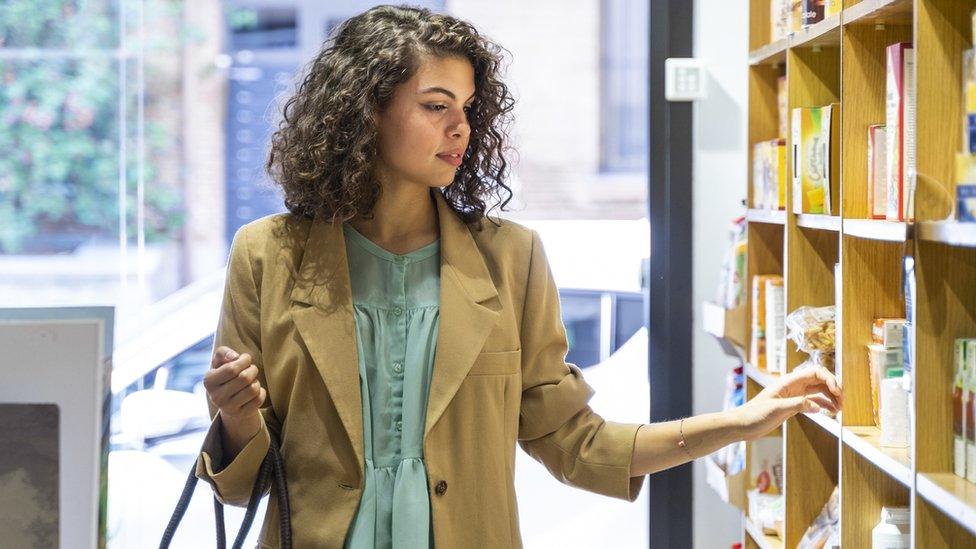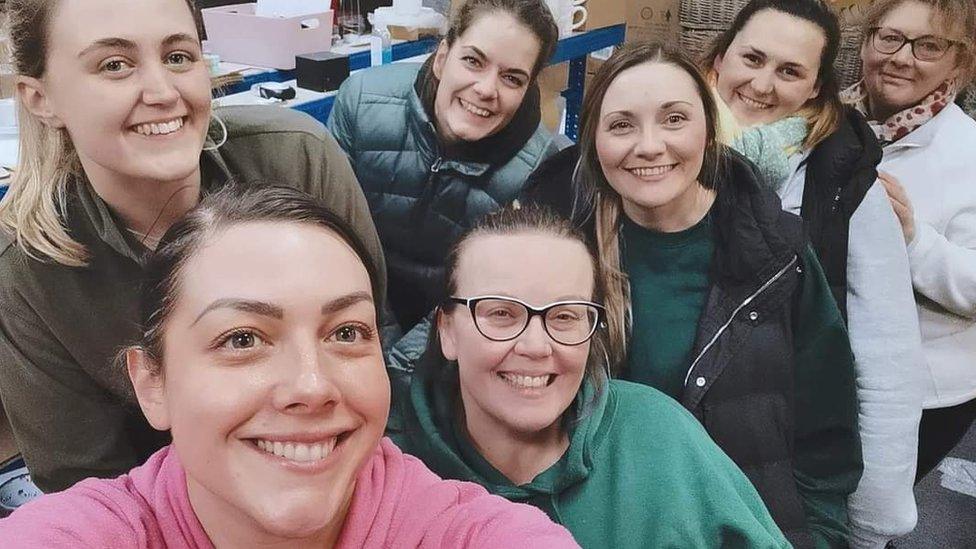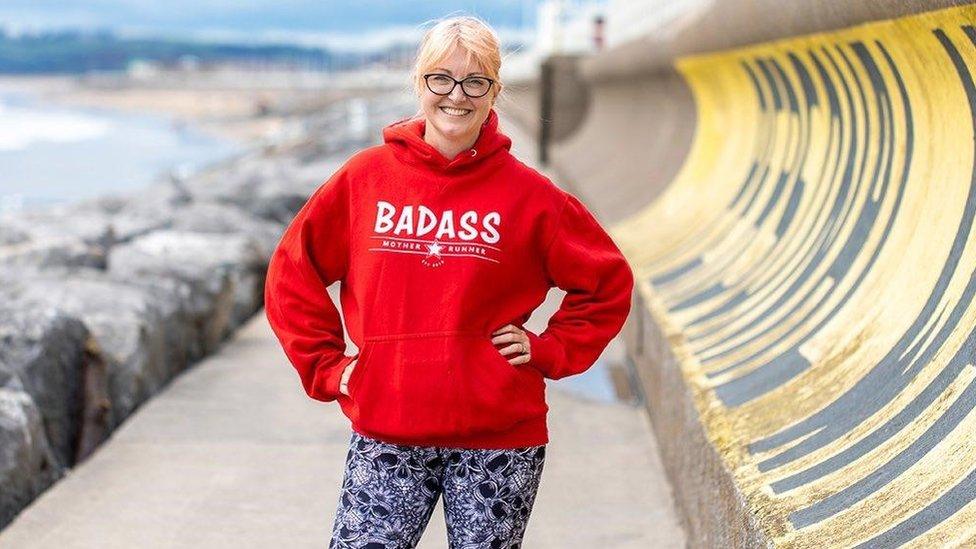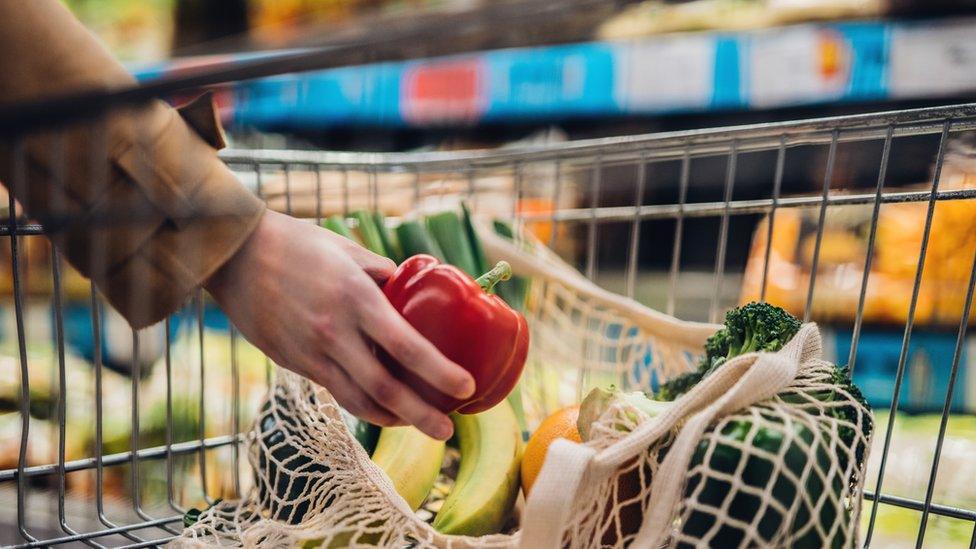Shop sales slow as people rein in spending
- Published
- comments

Sales in shops have slowed as household budgets come under pressure from the rising cost of living, the British Retail Consortium (BRC) has said.
Its figures show sales growth for March rose by 3.1%, the smallest increase so far this year and down from a 6.7% rise in February.
It comes as millions are having to deal with higher energy bills and taxes.
The BRC said pressure on people's finances and the war in Ukraine had "shaken consumer confidence".
Helen Dickinson, chief executive of the BRC, said customers faced "an enormous challenge this year" around their finances, which was "likely to be reflected in retail spend in the future".
Online fashion giant Asos said on Tuesday that its sales forecasts for the next few months carried greater uncertainty than usual as it was still unclear how the rising financial pressures on consumers would affect their spending.
Small business owners told the BBC they had seen a recent dip in sales compared to previous months at a time when they were also having to grapple with higher operating costs.

Lucy Rushton (front) says she is worried about the rising costs of running her business
Lucy Rushton, owner and founder of the Cheshire Gift Company, said she believed a lot of people were starting to be more prudent with their spending.
"Going into Easter, sales have definitely been lower than they were last year," she said.
Ms Rushton, who started her business online and stored products in her garage before moving to a warehouse, told the BBC the company's social media presence had helped with sales from loyal customers.
But she added: "I would be lying if I was not worried looking to the next year."
Ms Rushton said she and her staff wear thermals to avoid putting the heating on in the company's warehouse due to high energy costs.
"It is cold in the warehouse [but] I would rather keep my staff in jobs," she said.
She said higher shipping and packaging costs were having the biggest impact on her profits, but her team had "adapted" and found new ways to get the best value for money without having to pass on big price increases to customers.
'Clouds on the horizon'
With inflation rising at its fastest rate for 30 years, people in the UK are facing increased pressure from living costs. Fuel, energy and food prices have seen some of the biggest increases.
The rate at which prices rise has been forecast to reach 8.7% in the final three months of 2022, which means households may be forced to cut back.

Bev Logan: It's understandable that people have to be careful but it's a worry for many small businesses
Bev Logan, who set up her online women's sportswear business Badass Mother Runners during the first Covid lockdown, said sales had been strong until they "nosedived" in April.
"It's just a bit weird", she said. "April hit and things went eerily quiet.
"It's scary being a small business owner as your bills are going up just like everyone else's, but your sales are going down. It's understandable that people have to be careful but it's a worry for many small businesses."
Don Williams, retail partner at KPMG, said the slower rate of sales in March suggested "clouds on the horizon as household budgets come under pressure from rising costs, an increasing tax burden and competition from holidays".
"Additionally, retailers are facing their own battle with rising costs and inflation, and are walking a tightrope between absorbing rising costs themselves or passing these on to consumers," he added.

Food sales for the month fell year-on-year and online sales for non-food items also decreased
He said the big question was whether shoppers will reduce their physical and online shopping baskets in turn.
The figures from the BRC-KPMG retail sales monitor showed that overall sales fell by 0.4% in March from 12 months earlier.
Food sales for the month fell year-on-year and online sales for non-food items also decreased by 29%, compared with growth of 64.7% the year before.
Susan Barratt, chief executive of the Institute of Grocery Distribution, said food and drink sales figures faced tough comparisons to last year, when some lockdown restrictions started to ease.
"Easter was also earlier and we're yet to see holiday spending ramp up this year," she pointed out.
Related topics
- Published11 January 2022

